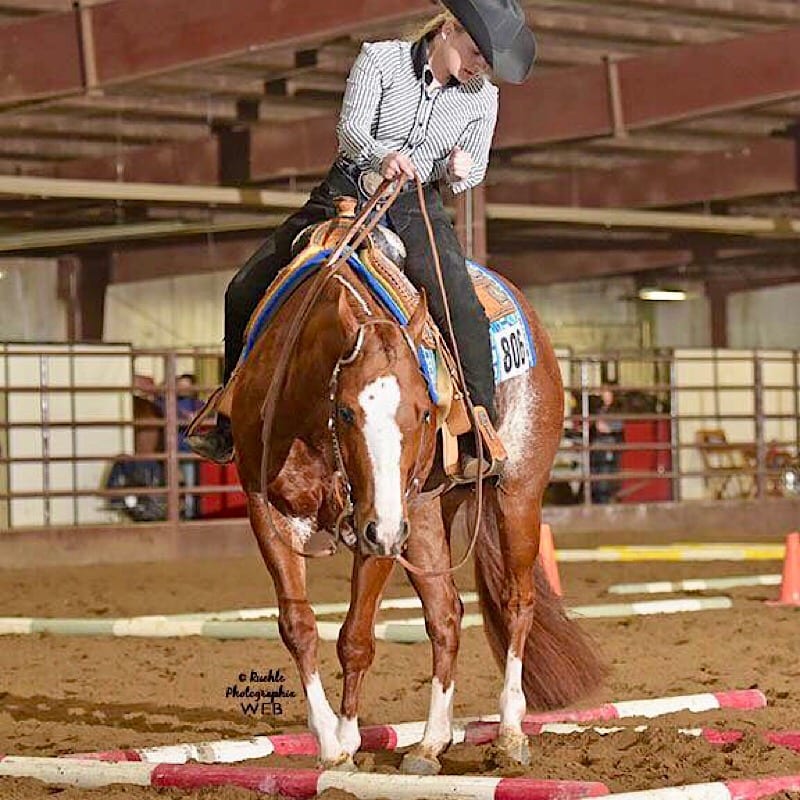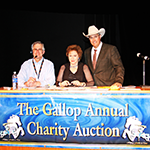Trail has been around since 1964 and has become one of the most popular and competitive classes in the show pen. It has evolved from testing a horse’s everyday ranch routines to a test of the horse’s movement over poles and through different obstacles.
Whether you have shown in the class forever or have just started learning trail, you may wonder what makes a strong trail horse. As with any class, some horses are stronger than others, but why?
When looking for a future trail prospect, how do you know if it’s going to make the cut?
GoHorseShow spoke to Whitney Lagace, owner of Whitney Ridge Stable in Higganum, CT, who has trained trail horses for over 18 years and has had much success at top shows. We also spoke to Tami McAllister, owner of Rolling M Ranch in Southbury, CT, who has shown and trained trail horses for 23 years.
Both of these trainers have years of knowledge and have built many successful trail horses. They shared their advice on building young trail prospects and explained that not only is the horse’s physical ability important, but their mindset as well.
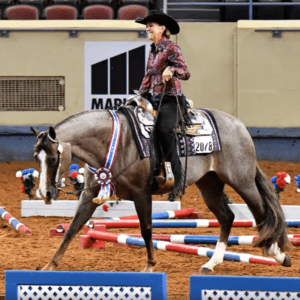 Physical Ability – One aspect of a trail horse Whitney stressed is their natural stride. She told us, “A horse’s natural stride is important because they need to be able to stretch and shrink their stride depending on the gap to the pole.” If a horse’s stride is too small, it may have difficulty with some obstacles.
Physical Ability – One aspect of a trail horse Whitney stressed is their natural stride. She told us, “A horse’s natural stride is important because they need to be able to stretch and shrink their stride depending on the gap to the pole.” If a horse’s stride is too small, it may have difficulty with some obstacles.
While not only is their natural stride significant, trail horses have to climb over elevated poles which takes strength. “Trail horses need to have strong self-carriage to get themselves over the high poles, especially at larger shows where the level of difficulty is higher,” Tami said. Strength is an essential trait in a successful trail horse, and lots of practice is needed to build up this strength.
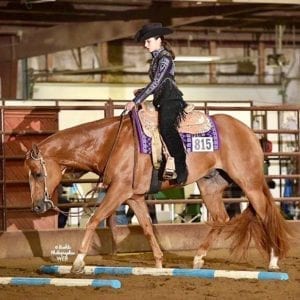 Mindset – A horse needs a proper mindset to compete in any class. If a horse doesn’t like their ‘job,’ it not only makes it difficult for the rider, but the horse won’t put in as much effort. A horse that enjoys their job wants to win just as bad as their rider, so they will pick their feet up higher over poles and typically have a positive expression.
Mindset – A horse needs a proper mindset to compete in any class. If a horse doesn’t like their ‘job,’ it not only makes it difficult for the rider, but the horse won’t put in as much effort. A horse that enjoys their job wants to win just as bad as their rider, so they will pick their feet up higher over poles and typically have a positive expression.
Tami told us, “A good trail horse needs to be patient, it takes time to learn how to rate and climb poles. There will be good days and bad days and they have to be patient and trust their rider to help them succeed.”
For riders who may not have had much experience in the trail, their horses need to be willing to teach them and forgive. Whitney said, “They need to be forgiving and be able to take everything in stride.” Trail takes time to learn, and a kind, forgiving horse makes learning easier and more fun.
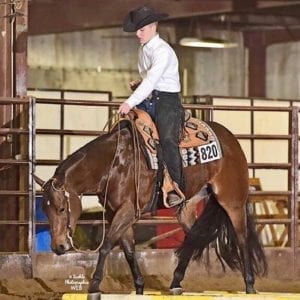 Starting Young – Both Tami and Whitney agreed that starting young is the best way to go. “I will start them on poles right away after they learn how to walk, jog and lope. I start very easy; nothing too stressful,” Whitney shared regarding how she starts her trail prospects. By starting young, it builds the horse’s confidence early on.
Starting Young – Both Tami and Whitney agreed that starting young is the best way to go. “I will start them on poles right away after they learn how to walk, jog and lope. I start very easy; nothing too stressful,” Whitney shared regarding how she starts her trail prospects. By starting young, it builds the horse’s confidence early on.
Every class takes time and practice; trail is no exception. The more patterns horses do, the more comfortable they become in the pen. By starting at a young age, there is usually less pressure right away because they have more time to learn. You can’t rush a good trail horse; it takes a lot of practice to build them up to be successful.
One of the hardest pieces of building a trail horse is time. It takes time, patience and lots of practice to succeed. Every horse is different; some may take to poles quickly while others may struggle in the beginning. Ultimately, a good trail horse is built by hardworking, determined riders.
About the Author – Jessica McAllister competes in all-around events with her AQHA gelding Midknight Invitation. She was part of Team USA in 2018 at the Youth World Cup in College Station, TX. She is verbally committed to ride for TCU’s equestrian team and plans to study veterinary medicine.


